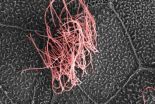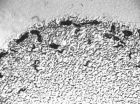(Press-News.org) Brain cancer cells are particularly resistant to chemotherapy — toxins enter the cells, but before the toxins can kill, cancer cells quickly pump them back outside. In fact, brain cancer cells are even better than healthy cells at cleaning themselves. This means that when hit with chemotherapy, healthy cells tend to die before brain cancer cells. Especially in the brain, killing healthy cells is bad.
Researchers at the University of Colorado Cancer Center have discovered a way to turn off the pumps — only in brain cancer cells and not in their healthy neighbors. Promising early testing provides hope for the nearly 45,000 people diagnosed with brain cancer in the United States every year, who are currently expected to survive less than 12 months after diagnosis.
The key is a chemical called glutathione (GSH).
The GSH pathway allows both healthy and cancerous cells to pump out toxins. The more GSH a cell makes, the more efficiently it can cleanse itself. Brain cancer cells may literally coat themselves with GSH, allowing them to pump out and thus survive doses of chemotherapy that quickly kill healthy brain cells. (This GSH pathway is the focus of a recent CU Cancer Center paper published in the journal Biochemical Pharmacology.)
But this same mechanism that makes brain cancer cells especially hearty may in fact be the key to their demise.
The idea is this: stop a cell's ability to make GSH and you stop its ability to detoxify — thus sensitizing the cell to even a low dose of chemotherapy. It's tricky to target GSH directly, but clinical trials are already underway for a drug that breaks a link in the chain that leads to GSH. The link is an enzyme called glutamate cysteine ligase (GCL), which cells need in order to make GSH.
No GCL means no GSH, means a cell is doomed to stew in chemotherapy rather than pumping it out.
Unfortunately, the drug in clinical trials stops ALL cells — healthy and cancerous — from making GSH. And by so doing, it sensitizes both healthy and cancerous cells to chemotherapy. Killing everything more effectively does little good. (The same could be accomplished simply by giving a higher dose of chemotherapy.)
So here is the trick and the promise:
"If we can selectively keep brain tumor cells from making GSH we can sensitize these tumors to chemotherapy, which may allow doctors to kill more tumor cells with a safe dose of chemotherapeutics," says Christopher Franklin, PhD, investigator at the CU Cancer Center and assistant professor of molecular toxicology at the Skaggs School of Pharmacy and Pharmaceutical Sciences.
Franklin is working with Philip Reigan, PhD, investigator at the CU Cancer Center and assistant professor of medicinal chemistry at the Skaggs School of Pharmacy and Pharmaceutical Sciences to do just that — targeting cancer cells' GSH while leaving the pathway unharmed in healthy cells.
To do it, they're using an exciting class of medicines called prodrugs. By itself a prodrug doesn't do anything — it floats harmlessly through the body. Only, when it comes in contact with another target chemical the prodrug releases a little payload.
In this case, the prodrug payload is the drug that stops cells from making GSH. And the chemical that tells the prodrug to release its payload is an enzyme specific to brain cancer cells. This means that only when near brain cancer cells does the prodrug stop cells' ability to make GSH. Given along with chemotherapy, the prodrug should turn the table on brain cancer cells, making them die sooner than healthy neighbors.
"The current standard of care adds only about three months to the life expectancy of a patient diagnosed with glioblastoma multiforme," Reigan says. "The promise of prodrugs that selectively target tumor cells is not only exciting, but it's desperately needed for the treatment of brain tumors."
INFORMATION: END
Iron is a popular topic in health news. Doctors prescribe it for medical reasons, and it's available over the counter as a dietary supplement. And while it's known that too little iron can result in cognitive problems, it's also known that too much promotes neurodegenerative diseases.
Now, researchers at UCLA have found that in addition to causing cognitive problems, a lack of iron early in life can affect the brain's physical structure as well.
UCLA neurology professor Paul Thompson and his colleagues measured levels of transferrin, a protein that transports iron ...
La Jolla ---- Scientists at the Salk Institute for Biological Studies have identified a gene that tells cells to develop multiple cilia, tiny hair-like structures that move fluids through the lungs and brain. The finding may help scientists generate new therapies that use stem cells to replace damaged tissues in the lung and other organs.
"Cells with multiple cilia play a number of important roles, including moving fluids through the respiratory tract, brain and spinal cord," says Christopher R. Kintner, a professor in Salk's Molecular Neurobiology Laboratory, who led ...
PASADENA, Calif.— Scientists have long seen evidence of social behavior among many species of animals, both on the earth and in the sea. Dolphins frolic together, lions live in packs, and hornets construct nests that can house a large number of the insects. And, right under our feet, it appears that nematodes—also known as roundworms—are having their own little gatherings in the soil. Until recently, it was unknown how the worms communicate to one another when it's time to come together. Now, however, researchers from the California Institute of Technology (Caltech) and ...
Sufferers of smoking related lung diseases could have their debilitating symptoms reduced following the discovery of a potential new treatment.
The discovery, by researchers at the University of Melbourne, Royal Melbourne Hospital, Australia, and the Brigham and Women's Hospital, Harvard Medical School, US, could dramatically improve treatments and slow the progression of COPD (Chronic Obstructive Pulmonary Disease) which includes the incurable condition emphysema.
COPD is a progressive disease that makes it hard to breathe and is mostly caused by excessive smoking. ...
FRESNO, Calif. – Can eating grapes slow or help prevent the onset of age-related macular degeneration (AMD), a debilitating condition affecting millions of elderly people worldwide? Results from a new study published in Free Radical Biology and Medicine suggest this might be the case. The antioxidant actions of grapes are believed to be responsible for these protective effects.
The study compared the impact of an antioxidant-rich diet on vision using mice prone to developing retinal damage in old age in much the same way as humans do. Mice either received a grape-enriched ...
Fungi may be unexpected allies in our efforts to keep hazardous lead under control. That's based on the unexpected discovery that fungi can transform lead into its most stable mineral form. The findings reported online on January 12 in Current Biology, a Cell Press publication, suggest that this interaction between fungi and lead may be occurring in nature anywhere the two are found together. It also suggests that the introduction or encouragement of fungi may be a useful treatment strategy for lead-polluted sites.
"Lead is usually regarded as a pretty stable substance," ...
CHESTNUT HILL, MA (Jan. 12, 2012) – Researchers from Boston College have discovered a protein that plays a pivotal role in the progression of the deadly diseases toxoplasmosis and malaria and shown that its function could be genetically blocked in order to halt the progress of the parasite-borne illnesses, the team reports in the current edition of the journal Science.
The protein, identified as DOC2.1, plays a similar role in the secretion of microneme organelles that are crucial to the mobility of the parasitic protozoa Toxoplasma gondii, which causes toxoplasmosis, ...
Preserving diverse plant life will be crucial to buffer the negative effects of climate change and desertification in in the world's drylands, according to a new landmark study.
The findings of the multi-author study, published today in the journal Science, are based on samples of ecosystems in every continent except Antarctica.
They confirm for the first time that the more diverse an ecosystem is, the more ecological functions it performs. It also has implications for carbon sequestration and soil health.
"This is the most extensive study of the links between function ...
Land areas that are a priority for wildlife conservation provide relatively high levels of ecosystem services such as pollination, water purification, food production, and climate regulation, so safeguarding them is expected to benefit people. Assessing these benefits to populations in ways that are useful to decisionmakers who guide conservation efforts has, however, proved difficult.
A global analysis published in the January 2012 issue of BioScience by Will R. Turner of Conservation International and his colleagues breaks new ground by analyzing the flow of benefits ...
Archaeologists examining late period Mayan containers have identified nicotine traces from a codex-style flask, revealing the first physical evidence of tobacco use by ancient Mayans. The study published in Rapid Communications in Mass Spectrometry reveals the flask is marked with Mayan hieroglyphics reading, "y-otoot 'u-may," ("the home of its/his/her tobacco,") making it only the second case to confirm that the text on the exterior of a Mayan vessel corresponds to its ancient use.
"Investigation of food items consumed by ancient people offers insight into the traditions ...


